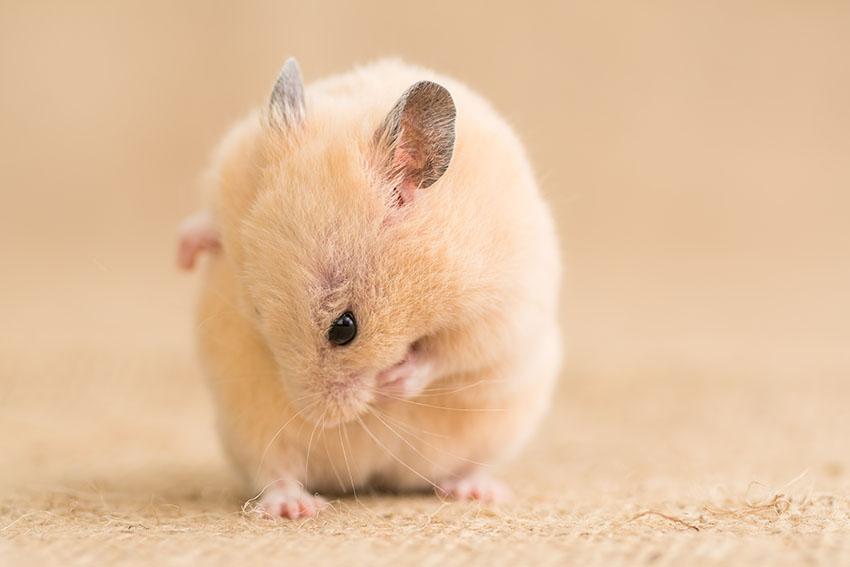Hamster behaviour varies between individual pets, but there are some behaviours that are common among all hamsters. From content behaviours, to those that signal potential stress or pain, learn all about the actions and behaviours of your hamster.
Normal hamster behaviours
There are several behaviours that are normal for hamsters. They indicate that your hamster is healthy and happy. Here are some normal behaviours you’ll notice from your hamster.
Grooming
You’ll see your hamster groom themselves on a daily basis. This is a sign that your hamster is healthy and happy, and able to keep their coat in good condition. They’ll lick, nibble, and wash their faces with their paws during their grooming sessions. This behaviour also means that your hamster is comfortable in their home, as they need to feel secure and content in order to groom themselves — something that can make them vulnerable to predators in the wild.

Hamsters like to keep themselves clean
Running
Hamsters have lots of energy. In fact, they can run miles every night on their wheel, through tunnels, or making burrows in their hamster habitat. Running is a natural behaviour that they share with their wild cousins, and it helps to keep them fit and healthy. During playtime with your hamster, create mazes or rearrange their tubes to give them more variety and challenge.
Sleeping
Nocturnal by nature, hamsters will sleep all day and wake up close to sundown to start their active hours. Hamsters will sleep in hideouts, or in bedding they’ve hollowed out. Every hamster is different in their preferences for sleeping positions and location, but you’ll most likely see your hamster curled up in a tight ball to sleep.
Hoarding
The word “hamster” comes from the German word “hamstern”, which means hoarder. They’ll stuff food in their cheek pouches to carry to their burrow or another designated spot to save for later. When you clean your hamster’s home, you’ll likely uncover one of their food stashes, which means that your hamster is just following their natural instincts. Your pet won’t mind if you remove these stashes, and it’s important to take away anything that’s old.
Negative hamster behaviours
Sometimes, your hamster may behave negatively in response to fear, stress, or pain. If you notice any of these behaviours in your hamster, it’s important to get to the bottom of why.

Hamsters may bite if they are stressed, afraid, or sick
Biting
Hamsters can bite for a number of reasons, and it’s important to remember that they always have a reason for acting this way. The most common reason for a hamster to bite is because they haven’t been hand-tamed — usually when they first come home. They’ll bite out of fear of being lifted suddenly, or because they’re not being held properly.
Your hamster may also bite if they have been woken up suddenly, or if you smell like food. They may also nip you if they’re in pain from an injury, or aren’t feeling well due to an illness.
Fighting
Even hamster breeds that cohabitate peacefully can begin to fight. Sometimes hamsters can begin fighting for no apparent reason, other than all species are territorial and are better off when housed alone. Fighting in hamsters is very serious, and can even be fatal. If you have more than one hamster in the same enclosure, you’ll need to monitor them daily for any changes in behaviour. If you notice any aggression between your hamsters, you’ll need to provide separate housing arrangements right away.
Unusual behaviours
Some hamster behaviours can indicate illness or injury. These actions warrant further investigation, or a trip to the vet.
Circling
A hamster that twirls or circles, or has a head tilt may be suffering from an ear infection or neurological disorder. This action is best investigated by a veterinarian with special equipment to treat rodents.
Excessive scratching
Hamsters that spend a lot of time scratching, or that scratch to the point of hair loss or injury are likely suffering from a skin condition. Do a health check on your hamster to see if there’s a visible cause for their discomfort. If there is no obvious reason for their scratching, it’s time to take them to the veterinarian.
Hibernating
In the wild, hamsters will hibernate to conserve energy during the cold winter months. But, pet hamsters shouldn’t feel the urge to hibernate, and it’s not in your hamster’s best interest to allow them to hibernate. If your hamster is sleeping longer than usual during the winter months, or if you find them cold, curled up in a sleeping position with shallow breathing, they have begun hibernating. Don’t attempt to wake them, but move them to a warmer place in your house until they begin stirring from their super-nap. Once they’ve roused fully, they should resume their regular routine.
Omlet and your hamster
We believe that hamster behaviour is an insight to their overall health and happiness. That’s why we’ve created hamster habitats that give owners a full view of their pet’s actions and routines, while still providing comfort and safety. All of our hamster products have been designed with the bond between hamster and owner in mind — building lasting trust and fond memories for hamster families all over the world.
Comments
There are no comments just yet